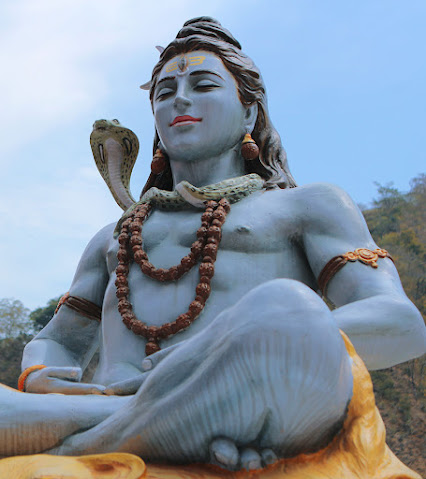Mahamrityunjaya Mantra of Lord Shiva
About Mahamrityunjaya Mantra
The Mahamrityunjaya Mantra is an ancient Vedic mantra, and its origin is not attributed to any specific individual. It is considered a part of the Rigveda, one of the oldest scriptures in Hinduism. The mantra has been passed down through generations and is deeply rooted in Hindu tradition. It is believed to have emerged from the collective wisdom and spiritual insights of ancient sages and seers. Therefore, while the mantra's precise authorship is unknown, it is considered a divine revelation and a sacred chant dedicated to Lord Shiva, embodying the essence of immortality and liberation.
The Mahamrityunjaya Mantra, also known as the Maha Mrityunjaya Mantra, is a sacred mantra in Hinduism dedicated to Lord Shiva. Here is the English translation and meaning of the Mahamrityunjaya Mantra:
"Om Tryambakam Yajamahe
Sugandhim Pushtivardhanam
Urvarukamiva Bandhanan
Mrityor Mukshiya Maamritat"
Translation:
"We worship the three-eyed one (Lord Shiva),
Who is fragrant and nourishes all beings.
May He liberate us from death,
For the sake of immortality, even as a cucumber is severed from its bondage."
Meaning:
"Om Tryambakam Yajamahe": We worship the three-eyed one (Lord Shiva), who sees beyond the physical and represents the divine consciousness.
"Sugandhim Pushtivardhanam": Who is fragrant and nourishes all beings, bestowing health, wealth, and prosperity.
"Urvarukamiva Bandhanan": May He liberate us from the cycle of birth and death, just as a ripe cucumber effortlessly separates from the vine.
"Mrityor Mukshiya Maamritat": Grant us liberation from death and grant us the boon of immortality.
The Mahamrityunjaya Mantra is believed to have profound healing and transformative powers, invoking Lord Shiva's blessings for protection, well-being, and spiritual growth. It is often chanted for health, longevity, and the alleviation of physical and mental suffering.
Faq
Q: What is the significance of the Mahamrityunjaya Mantra?
A: The Mahamrityunjaya Mantra holds immense spiritual significance in Hinduism. It is believed to invoke the blessings of Lord Shiva, the destroyer of death and the harbinger of immortality. Chanting this mantra is thought to promote physical and mental well-being, protect from untimely death, and aid in spiritual growth.
Q: How is the Mahamrityunjaya Mantra traditionally chanted?
A: The mantra is typically chanted with devotion, focus, and reverence. It is commonly repeated in cycles of 108 or multiples thereof, using a Rudraksha or crystal bead mala (prayer beads). It is often chanted during spiritual practices, rituals, and auspicious occasions, or as a daily practice for seeking divine blessings.
Q: What is the best time to chant the Mahamrityunjaya Mantra?
A: While the mantra can be chanted at any time, it is believed to be particularly potent during early morning hours (Brahma Muhurta), before sunrise. Chanting during this serene time is said to enhance the mantra's spiritual vibrations and effectiveness.
Q: What are the benefits of chanting the Mahamrityunjaya Mantra?
A: Chanting the Mahamrityunjaya Mantra is believed to have various benefits, including physical and mental well-being, healing of ailments, protection from negative influences, and relief from fear and suffering. It is also considered a powerful aid in overcoming obstacles, promoting spiritual growth, and attaining liberation from the cycle of birth and death.
Q: Can anyone chant the Mahamrityunjaya Mantra?
A: Yes, the Mahamrityunjaya Mantra can be chanted by anyone, regardless of gender, caste, or religious background. It is an inclusive mantra open to all who seek its blessings. It is advisable to chant the mantra with sincerity, respect, and a pure heart, focusing on its meaning and intent.
Q: Is it necessary to know the exact pronunciation and meaning of the mantra?
A: While it is ideal to chant the mantra with correct pronunciation and understanding of its meaning, the divine vibrations and intention behind the chanting are also significant. It is recommended to learn the correct pronunciation and meaning of the mantra, but sincere devotion and heartfelt chanting can still invoke its spiritual power.
Q: Can the Mahamrityunjaya Mantra be chanted for someone else's well-being?
A: Yes, the Mahamrityunjaya Mantra can be chanted on behalf of someone else's well-being. It is believed that the positive vibrations generated through the mantra's repetition can extend to others and benefit them in their healing, protection, and overall spiritual journey.
Q: What is the duration or frequency of chanting the Mahamrityunjaya Mantra?
A: The duration and frequency of chanting the mantra can vary based on personal preference and spiritual practices. It can be chanted for a few minutes or extended to longer sessions. Some individuals chant it daily as a part of their spiritual routine, while others may choose to chant it during specific periods or occasions.
Q: Can the Mahamrityunjaya Mantra be chanted in any language?
A: While the original mantra is in Sanskrit, it can be chanted in any language that is comfortable and familiar to the practitioner. The essence and power of the mantra transcend language barriers, and the sincere intent and devotion behind the chanting are of utmost importance.




Comments